ICT Academy started operating in Tamil Nadu in the year 2009. The objective of ICT Academy is to bridge the gap between industry and academia. In this pursuit, there are three key stakeholders, industry, academia and government; ICT Academy pursues leveraging all the three elements to ensure the industryacademia gap is bridged.
Having convened 36 editions of Bridge conferences, ICT Academy continues to embark on the journey with intent that is not just confined with India’s development, but with a vision of producing futuristic workforce for the entire world.
It is the 10th year of ICT Academy, whose credit is owed to the entire stakeholders of ICT Academy all through its journey since the inception. In fact, the entire state of Tamil Nadu has embraced ICT Academy with a big hand.
ICT Academy was formed with the intent of providing value as a service. Value differs from one entity to the other invariably according to the perception of the matter in discussion. ICT Academy’s value proposition is to provide win-win solutions to all its stakeholders, which in turn adds to the growth of this great nation.
The responsibility of the educational institutions is education itself. Primarily, there is a significant difference between education and training, and education institutions should focus on the former rather than the latter.
POWER PANEL

Lakshmi Narayanan
Chairman, ICT Academy,
Emeritus Vice Chairman,
Cognizant Technology Solutions
More often there is a tendency of preparing students to get placed in companies in the corporate world.
I want to make it a point that there are three broad alternatives to students that are coming out of educational institutions. Firstly, they can of course be part of the corporate sector. Secondly, they can venture into entrepreneurship and the third one is education itself; students can become teachers, researchers, can be part of teaching and training institutions more to which they should enter into teaching and research institutions, which is very important.
ICT Academy, initiated with a government grant to train 5000 teachers accomplished the mission and emerged to be a sustainable model that connects industry, academia and the Government.
The emergence of this Academy inspired the leading technology companies to open up their academy and curriculum in partnership with ICT Academy and the exercise has been successful. ICT Academy is also partnering with more technology companies, as newer technologies emerge. The recent partnership with AWS is a notable collaboration.
Further, I insist that every academician gathered here to go through the recent recommendations in a report published by AICTE – the regulator for technical higher educational institutions and NASSCOM a team headed by Dr. BVR Mohan Reddy the past chairman of NASSCOM and the present head of the IT/ITeS Sector Skill Council, who is also one of the board members of ICT Academy.

DR. M. MANIKANDAN M.B.B.S., M.S., FIAGES
Hon’ble Minister for Information Technology,
Government of Tamil Nadu
At the outset I extend a warm New Year and Pongal greetings to all of you. I’m proud to state that Tamil Nadu was one of the states in India to come out with an exclusive policy for IT industry in the year 2002.
It has enacted several proactive measures to enable IT and ITeS companies to do business in the state with utmost ease and felicity.
Besides, our visionary leader Hon’ble Puratchi Thalaivi Amma formed a separate department in the Government, namely the Information Technology department in the year 2001 with an objective of the development of IT industry as well as ensuring the development of e-Governance.
Vision 2023 was launched by our late iconic leader on 24 March 2012. The goals of our vision document constitute measurable outcomes with positive impact on the lives of our people.
This document is widely acclaimed as a path-breaking model in perspective planning for good governance, inclusive growth and development that touches the life of every citizen in the state of Tamil Nadu. The Government has taken various steps for the development of IT and ITeS related sectors in Tamil Nadu.
There are 80 IT and ITeS Specific Economic Zones established at Chennai and in the tier-II cities like Coimbatore, Madurai, Trichy, Salem, Tirunelveli and Hosur in a total area of 1,322 acres with all the necessary infrastructures at a total cost of Rs. 326 crores. It has been established with the aim of creating employment opportunity for the youth in IT sector, and to develop IT industry in the State of Tamil Nadu.
Further, to strengthen the entrepreneurial capabilities and to give the impetus to startups, a startup warehouse with 90 seater capacity at the TIDEL Park, Chennai and another one at Coimbatore with 64 seater capacity were established by Puratchi Thalaivi Amma.
Tamil Nadu Government has also established a state data center for enabling the government departments to host their applications and services on a common redundant, secured and controlled environment and thereby easing the process of integration and resource optimization.
Utilizing such infrastructure and the opportunities to contribute to the development of the nation, the education institutions should continuously improve the quality of teaching and learning in order to adapt to the changing qualification needs of the industry 4.0 job market.
Colleges should have a deep engagement with the employers. Without strong links with the industry colleges have a deficit of knowledge on what is actually expected by the industry. Hence, the students and the faculty members get less exposure to the evolving technologies of the industry 4.0.
So, it becomes essential for the academia to collaborate with the industry in such a way that it expose students to the industrial scenario to enable them with real-time experience in their respective domains.
To overcome the above mentioned issues our revered leader honorable Amma has already strengthened the ICT Academy of Tamil Nadu which was established with the aim to improve the quality of students passing out of institutes and colleges in Tamil Nadu, to make them industry-ready and immediately employable in the Information and Communication Technology manufacturing field.
So far ICT Academy of Tamil Nadu has trained 30550 faculty members in the year 2017-18. They have trained 4799 faculty members belonging to various engineering and arts and science colleges in Tamil Nadu. These trained faculty members in turn have trained 3,36,700 students of engineering and arts and science colleges with a noble intention of making them industry-ready.
To facilitate the student community to acquire better computer skills and innovative schemes of free laptop computer to students have been introduced by our visionary leader on 15 September 2011, and till date the Government has supplied 38,36,605 laptops free of cost, which amounts to 5,642 crore rupees, making a record of world’s largest laptop distribution at free of cost scheme. Such scheme is available nowhere in the country, except the state of Tamil Nadu.
I am very happy to inform you that with the able guidance of our Honorable Chief Minister, it is proposed to purchase and distribute 15,66,000 laptops at free of cost to the student community for their upliftment, which is scheduled to be completed by the end of February 2019.

ARUN ALAGAPPAN
Executive Director,
Cholamandalam Investment and Finance Company Ltd.
We live in a world where change, volatility and ambiguity are the only constants. The pace of advancement in the technological landscape is surpassing beyond imagination. While this prevailing uncertainty can appear as a threat it provides an unprecedented platform to aspire for opportunities that are bigger and better than ever before. The pace and scale of these changes may appear intimidating, however, the prospects that present for the future of technological progress is staggering.
While the world is becoming bigger and bolder so is India. We have fundamentally moved into an era where we have decentralized digital innovation. We are at the cusp of digital revolution in India, which will manifest itself in multiple forms in the next decade. While innovation is decentralized, we need to adequately tap into the micro ecosystems of innovation and create mutually beneficial platforms. In addition to building of competitive advantage by consolidating strengths, collaborations and partnerships are also essential to enable one integrate offerings to customers.
Agility, adaptiveness, and the ability to visualize potential offerings will be the fulcrum of business leadership of the future. It is hence imperative that there are students geared towards such a thinking.

R DINESH
Managing Director,
TVS Logistics Services Limited
In today’s world, it’s not about logistics anymore; it is about supply chain solutions, it is about how do we make things come together. In short, the industry is looking for such talents that have the ability to cross-deploy the technology skills into a supply-chain business model. This expectation has risen with the industry as nothing in supply chain is going to work where there is no link with information flow. Information and technology flow coming together in the supply chain sector will be the future of this business.
We as industry will be working with academia in creating such talents with the mindset to comprehend this industry with the right mindset, with the ability to look at this sector as a combination of technology and solutions together. Our organization also assures that it will initiate industry-academia collaboration through ICT Academy.

S SHANKAR
Film Director, Producer and Writer
One of the foremost functions of art is to take people to impossible places and bring in some miracles that reality doesn’t allow. The movie 2.0 involved many technologies like animatronics,light stage technology, 3D printing technology, virtual cam technology, 4D sound and various design software like Autodesk’s Motion Builder software and Maya, and VFX software and the capabilities that work the magic with the tools.
In the context of industry 4.0, 3D printing is a major theme, which is to change the way individual components and customized products are produced. Rather than building models by hand, we are now turning to 3D printing, which is a hottest technology around.
Working with some of the world’s top VFX studios in the US, UK and others across the world, I could see that Indian animation and VFX industry is gaining acceptance around the world. It’s a great news that Hollywood nowadays is outsourcing Indian VFX talent.
I do see a boom in the Indian VFX talent. There are competent studios with creative abilities and technical excellence. I’m sure that in India we have the talent with artistic and technical excellence on par with world standards, but they remain untapped, unrecognized and isolated from the mainstream. I wish that Bridge ICT Academy will try sharpen the tools, nourish skills, and work towards being a bridge between competent talent and the VFX industry.

Prof. M K Surappa ,
Vice Chancellor,
Anna University, Chennai
Inclusivity midst a revolution is a challenge that should be counted and counteracted by the stakeholders of the society. Every benefit of this industrial revolution should reach every strata of the society. Further, education sector should also make a paradigm shift right from the level of sensitizing the students about picking the right streams to guiding them to pick various skilling streams right at the counseling level would add value to them.

Padma Jaiswal IAS,
Secretary - Department of Information Technology,
Government of Puducherry
Academia should focus on moving from the older practice of cause and effect based research, which evolved hypotheses based on the inferences. Today, the changing scenario demands product based research in addition to the inference based research. To venture into such product based research, there is a need for industry-academia collaboration.

J KESAVARDHANAN,
Founder and CEO,
K7 Computing
We are in the midst of industry 4.0, which has arrived long back. Industry 4.0 is all about connection; connected devices. Moreover, 4.0 revolution is not restricted just to manufacturing; the revolution is happening in almost every industrial sector. Hence, there is a room for more opportunities, and the academia that has fortunately started disseminating the new technologies to students through specialized courses should increase the proportion of the same in order to train them on the new age fundamentals that will equip to adapt to any future evolution.

KRISH GANESAN,
Vice President - Human Resources & Global Head, Recruitment,
Tata Consultancy Services
IT industry survives with the academia; without academia existence of IT industry is questionable. IT industry is not all about programming and coding. IT industry is cyclical in nature that is driven by various factors like invention, innovation, propagation (marketing), deployment etc., and business 4.0 is trying to bring all these multiple players into picture. In short, Business 4.0 is not a story of unemployment; it’s a story of new or a re-employment.

VISHAL DHUPAR,
Managing Director – Asia South,
NVIDIA
Computing has been the greatest innovation of mankind, which is based on the fact that there is no invention that I know of that has delivered 100,000 times performance in 25 years of this journey. From early computing methods it has evolved till AI today, and AI is going to move into the industry as Industrial AI. Such disruptive technologies are coming into play that drastically change everything of the businesses, right from the way they are launched till what they produce and how they are marketed.

SEEMA KUMAR,
Country Leader, Developer Ecosystems and Startups,
IBM India and South Asia
The study done by IBM in terms of skills in India, in which more than 500 institutions in India were surveyed. The study sprang back with various data like 61% of educators felt that the higher education system at large was incapable of responding to some of the industry demands. On the other hand, India is very uniquely positioned to capture a lot of the opportunities available in the technology domain. So, all we need to do is to literally bridge the gap in building skills that are relevant. Concurrently, India is the second largest country in terms of developers, which is a populace close to 4 million. We are prone to emerge shortly as the largest country in the world in terms of mere software developers. But the industry is ever evolving that demands such talents that possess the ability to be life-long learners. Hence, imparting such traits like learning, unlearning and relearning are highly essential in today’s scenario.

VINCENT QUAH,
Regional Head - Education,
Asia Pacific Global Public Sector,
AWS
Today, you need not wait for you to get all the right pieces acquiring like technology to do the innovation that you wanted to do. You can actually start now, as you have the power to innovate in your hands right now, to address the challenges of industry 4.0. One of the big thing about innovation is having an innovation culture. Culture of innovation involves a consistent drive to achieve the best, to satisfy the customer needs and believe that the company is a day one company. All these traits will help every innovator to sustain and scale in their ventures.

KISHORE BALAJI,
Director - Government Affairs and Public Policy,
Intel
There is this buzz about automation taking away jobs. I believe that automation wouldn’t take away jobs on the whole. Instead, automation would take away such jobs that exist today and replace them with evolved ones. Automation actually automates the processes that are mundane and regular, enabling an organization to move the resources to more cognitive jobs.
Similarly, for Ai to go out and make the positive impact, so that the country and institutions and people can leverage three things need to be gotten right. The first of them is the policy aspect. The second is the technology and third is skilling the future. Today, India has the opportunity to get its policies right, for which three things are needed to be focused; first of all India has the opportunity of solving problems by itself is something that the policy it can govern. Secondly, our nation should frame the right policy that accelerates the market, making the business viable, making the ecosystem thrive, making more and more startups come up. Finally, such policies should be framed that accelerates the adoption through getting the skilling ecosystem right.
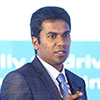
SASHANK CHITHAJALLU,
Senior Project Manager – Technology Platform, AI/ML,
Oracle
People today, put forth a question in common, demanding the difference between AI (Artificial Intelligence), ML (Machine Learning) and DL (Deep Learning). All the three are not synonymous forms of a single concept, but are the subsets. AI is primarily an intelligent system that is capable of mimicking a small intelligent program, for example software that help you file your taxes etc. But the problem with AI is that it doesn’t adapt to data. Whereas, Machine Learning and Deep Learning can use the data and adjust themselves, learn and give outputs based on its learning.

NITIN KOTIAN
Country, Head, Cloud Security & MSSP – India & SAARC,
Palo Alto Networks
The transformation that is happening today in every stratum of the technology landscape is impacting every one of us. It impacts our personal lives, our lives at the enterprises, the places that we work etc. We should be aware of the fact that unlike in the past decades, close 12 unique technologies are happening concurrently, which is a unique phenomenon; but one thing that can derail this whole process is security. We are in a scenario which has put the aspects of speed and risk exactly opposite to each other. If we don’t address the security risks, threats and issues, it can result in horrible consequences. As the technology penetration into businesses and the society is wide scale, the impact can also be very huge. When security threats are thought of today, it is no more a discussion about the malware and ransomware. Today, when the enterprises are using AI and ML technologies, the hackers are also using the same, which has evoked the necessity of serious security systems. In such setting there is a need for transformation in the field of security. Attackers and hackers have become highly sophisticated, whereas the solution providers are still manual. This situation should be contained, to ensure that we are safe.
YouTube Award Recipients Acceptance Speech
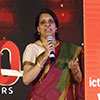
BHARATHI BHASKAR
Senior Vice President,
Citi Bank
Receiving the award, Ms. Bharathi Bhaskar said “I am stunned to see that the motivational talk delivered at one of the Youth Summit of ICT Academy has gained lakhs of views. This award peps up my confidence and gives me the thrust to motivate more and more youth through my discourses in the future. Being in the corporate, I have been seeing many freshers who have enough talent and energy, but they struggle when they present themselves to others. They lack the communication skills. In the video, I just shared my personal experience of how from a Tamil Medium education background, I overcame the challenges when entering the college and the corporate world. This recognition reinstates the fact that counseling the youth with our own experiences helps them to regain their confidence. I will place this award in my living room to be reminded that I should encourage the youth to pursue their dreams.”

S RAJA
Media Personality
Raja accepted the award and confessed that this was his first award on a grand stage. Further, he said that speech was delivered to a huge crowd of 3,000 students at Coimbatore years back. He added, “I have spoken in many pattimandram (debates) in front of elders and middle-aged persons, but speaking to the youth, that too a motivational talk is a big challenge. That was a new experience and was nervous too. But I managed it well. Society has endorsed us for our humorous speech, but this was a platform to prove that we too can inspire people. I always believe in the power of youth. Sculpting their thoughts could drive them towards the right direction. ICT Academy does this well by bringing the leaders and experts close to the students and shaping them for a bright future.”

V NANDAKUMAR IRS
Government of India
On the occasion of receiving the award, Nandakumar said, “When the students are in crisis, they hit my videos first in YouTube. ICT Academy YouTube channel has took my content to the Tamil people across the world. Once a student appreciated this particular speech on ICT Academy YouTube channel in a tea shop, and on other occasion a Tamilian who resides in Mexico, invited me to give a motivational talk to the Tamil residents in Mexico. Receiving this award is a proud moment and I will cherish this forever”, concluded Nandakumar.
Power Panel Discussion 4.0 - The Trends and Skill Demands
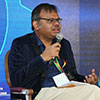
Viswanathan Venkat,
Director - Talent Acquisition
Wipro Ltd
The key player behind IT industry achieving milestones and progressing is academia. The industry is in fact enjoying the fruits of the academia’s efforts in producing industry-relevant talents. This panel discussion will look for evolving avenues to enhance industry-institute collaboration and will disseminate the challenges that the industry faces.
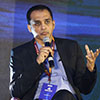
SRIVATHSAN V M,
Senior Director and Head Human Resources,
Virtusa
IR 4.0 is not just limited to the IT sector, it is very pervasive and penetrating across industries. In such changing scenario, the whole talent acquisition model is also changing. Earlier, companies used to visit campuses, from which the whole approach has changed today. Now, the institutes and industries are in a kind of collaborative environment, where industry works hand in hand with the institutions and has come up with a COE model that trains students in specific technologies at specific institutes. Further, the industry is also working with various institutions in terms of developing the curriculum. The next shift that the industry has made is about training the trainers, by absorbing them into the industry as trainees and seat them back into the institutions to train the students.

VASUDEVAN RAJAGOPALAN,
Head – Talent Acquisition (India)
TCS
In the past there had been a question towards the industry, asking for why talents were recruited from a particular set of institutions or regions when talents are available everywhere. This issue has been addressed by TCS through conducting the TCS National Qualifier Test, which made sure that talents from every corner of the nation participated and became a part of the organization. The next thing posed to us by academia in forums like these was about creating ample internship opportunities. TCS will be soon announcing about the internship opportunities it is working upon.

MAYA SREKUMAR,
Assistant Vice President,
Cognizant
Learning happens almost through every activity of our day. In the industry today, the big missing piece is the attitude to get continuously re-skilled and apply that in an area. Students even from the creamy tier of the institutions lack the basic skills and the competence to crack simple codes. Even after going through several core competency development programs and self-learning courses most of the lot from the employee pool and student pool fail drastically. Even bigger brands in the corporate struggle to re-skill its own employees and deploy them into newer projects. While facing such lots is increasing inside the industry, academia can pitch in to solve the problem by focusing on hands on training and skilling, and not just clearing the assessments. This shift shall induce the students to take the trainings and internships seriously and thrive.

SRERAM RADHAKRISHNAN,
Head - Human Resources,
Atos Syntel
Gone are the days, we graduated through a 3 or 4 year course and that kept us relevant all through a life-time career. Today, learning never ends; one has to keep updating to stay relevant, as the skills acquired or the knowledge earned become obsolete in shorter span of time. Hence, it is imperative to have an open mind to keep updating. Moreover, everyone on this earth requires someone who always show us the mirror and guide us in the right path. Precisely, industry and academia should help each other in such a way that both are benefitted.
Power Panel Discussion 4.0 - Industrial Collaboration for Training and Internship

R VENKAT NARAYANAN,
President – Human Resources Information Technology & Education, Rane Group
For internships to be productive, there is a lot of time and effort investment required from both industry and the academia. In this industry revolution 4.0 scenario, primarily all the teachers should first of all go for internships in corporate. Secondly, the training and placement officers should go for internship in corporate. Further, the management and board members should spend time at the corporate houses to understand at firsthand what goes on in the industry

BIKRAM K NAYAK,
Head – Talent Acquisition,
Larsen & Toubro
Concentrating on enhancing the soft skills in students is as equally important as instilling the hard skills in them. Today, the individual that is socially and emotionally intelligent is the one who would climb the career ladder. Resilience, agility, adaptability etc. are the skills that will differentiate an individual from the common pool.

UMA RAO,
Vice President - Human Resources,
Ashok Leyland Limited
The challenge faced by all the academic institutions and industry together today, is to identify talent very early on parameters that are so disruptive from what it has been so far. Today, when hiring happens in a traditional methodology, which is based on some cut-offs and some set of filtering mechanisms put in place may or may not help getting the best talent. Further, as long as organizations go for a very straight forward way of selecting, and then expect the resources to be great innovators when they are on board, the void will be existent. Hence, organizations should re-think on what kind of talent is required for them before venturing into the talent hunt.
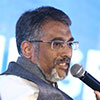
BABURAJ NAIR,
Chief Human Resource Officer,
The Hindu Group of Publications
There are three major things to be done in terms of strengthening the educational institutions. Firstly, building sustainable, successful institutions; secondly, building value driven institutions and finally building creative institutions is essential. These three dimensions, if instilled into every educational institution in reality, it would make a big difference in the quality of talents produced by the academia. To build such institutions, it is essential to have such passionate and vibrant academicians playing an active part on their role.